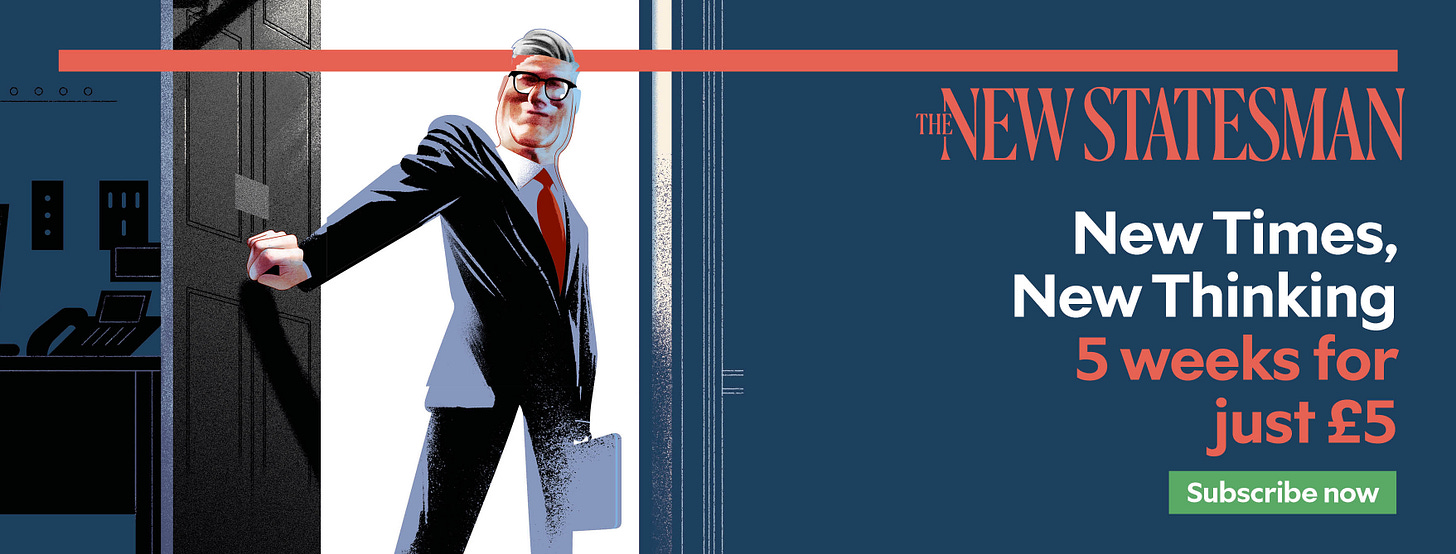Morning Call: A bigger Labour crisis lies ahead
Major tax rises by Rachel Reeves at the Budget are now inevitable.
Good morning, Rachel here.
Well that was a disaster. After not one but two U-turns that essentially gutted the welfare reform bill Keir Starmer last week insisted he was not going to blink on, the government still only won by 335 votes to 260, essentially halving its majority for a piece of legislation that doesn’t save anywhere near the money it was intended to.
If you haven’t already read Megan Kenyon’s excellent reaction on how the reversal on Personal Independence Payments (Pip) cuts went down in the Commons last night, including lefty firebrand Andy McDonald incredulously demanding to know “what are we supposed to be voting on tonight?”, check it out here. You can also read my warning on how one-time rebels rarely go back to being well-behaved MPs, and George Eaton’s profile of the man at whose feet many Labour backbenchers are laying the blame: Morgan McSweeney. Oh, and I was joined by Tom McTague and Will Dunn to figure out how the hell we got here on the New Statesman podcast, too.
It’s a rival podcast, however, I’m going to turn to as we dissect the kind of parliamentary debacle normally seen at the tail end of a government rather than one year in. Way back in the distant past, before the first set of concessions had been offered to the 126 MPs who signed the wrecking amendment (Thursday), Ed Balls used his double act with George Osborne to offer some advice for the government: “pull the bill and regroup”. Trying to rush through a last-minute compromise to appease the rebels, he argued, was risky. “The danger is you don’t go far enough… it ends up being unprincipled and messy.” Instead, it would be better for the government to accept that it didn’t set out the moral case clearly enough and invest in getting it right, coming back with a set of new proposals in autumn after “a period of principled consultation”. “You actually get yourself back on the front foot with the purpose of this legislation and why you’re trying to do it,” Balls explained.
The point is not that the former Treasury Secretary’s advice is uniquely insightful – many commentators and ex-politicos were saying the same thing last week. The point is that Downing Street failed to heed it. Its panic at needing to save a couple of billion after Rachel Reeves found she had a hole in her figures in the spring statement blinded it to what everyone in Westminster was warning: that welfare reform is complicated and emotive and needs time to get right. It was so focused on the aim of saving what is actually a relatively small amount in terms of both the overall public spending budget and the disability bill itself (forecast to rise by £30bn from its 2019/20 level to 2029/30, as David Gauke points out) that it missed first the bigger picture, then the strength of anger among Labour MPs, then the risks of piecemeal compromise. The result was Tuesday night.
You can argue that the original legislation was a mess, and that there are ways of reducing the welfare bill without putting the most vulnerable disabled people at risk – such as investing in a process that better assesses people’s capabilities, alongside ensuring the right healthcare support is available (it is, one former Labour MP told me, a sign of chronic dysfunction that individuals with mental health conditions are claiming Pip to fund private counselling they can’t access on the NHS). You can also argue, as a Labour MP with personal experience of the benefits system did, that the legislation tried to do exactly this and was misrepresented to the point that disabled people were terrified of changes that would not actually affect them.
That argument is now pretty much moot. The questions are no longer around how to deal with the rising number of people falling out of the workforce on health grounds, but on how – or, indeed, if – a government that has just lost an argument with its backbenchers so spectacularly can regain its authority. Other fights are coming: on the two-child benefit cap when the commission on child poverty returns its findings in autumn, on reform of SEND provision, on further pay settlements for NHS workers and other unions. And that’s assuming the OBR doesn’t downgrade growth again and slash the Chancellor’s headroom further. The crisis is only just starting.
What can be done? Twice now – on the Pip cuts and the Winter Fuel Allowance – Downing Street has expended the kind of political capital you’d expect it to save for when it really needs it trying to make modest savings, and been left with nothing in return. Having a big fight over something small (in cash terms) has proved a disaster. So how about having a big fight over something big instead?
This is our New Statesman cover story this week, in which Will Dunn urges Rachel Reeves to “Just Raise Tax”. It may seem like counterintuitive advice for a government that has clung to its misguided election promise to keep the three biggest tax levers untouched (income tax, national insurance and VAT), but as Will lays out, Starmer and his team don’t have much of a choice: “You can try to make compromises that will allow you to muddle through, until you face disaster at the next election. Or you can try to make history.” (He also has some big ideas about how to simplify the tax system in a way that improves things for both working people and the economy, which I won’t spoil in Morning Call – go and read the whole thing.)
No one is saying this would be easy or popular. Already Kemi Badenoch has been blasting the idea. But “easy” and “popular” are not words that describe the government’s agenda so far. Tunnel vision has driven them into crisis – as Ed Balls put it, they need a way to get back on the front foot. Whether Starmer and Reeves could make a reset of this nature work is highly uncertain. It would be a huge risk. But what’s clear from last night is that the “tinker around the edges and hope you get lucky” approach comes with risks too.
Rachel’s picks
As mentioned above, Will Dunn has some advice for the government: just raise tax.
David Gauke argues that Labour’s rebel MPs are rubbish at maths.
Will the special relationship between Keir Starmer and Morgan McSweeney endure? George Eaton has thoughts.
And for something entirely unrelated to the welfare bill and the government’s economic travails, Finn McRedmond wants you all to stop taking Glastonbury so seriously.
Clean energy is one of the key sectors in the Government’s Industrial Strategy – and at Liberty Global, we’re helping to deliver the infrastructure and innovation to power it.
Through companies such as Egg, Believ and Formula E, we’re developing everything from EV charging networks to solar farms to next generation technology – to help drive the green transition across the country.
See how we’re investing to power the clean energy revolution: https://www.libertyglobal.com/about/public-policy/powering-uk-growth/
Mailshot
Times: McFadden says Labour will not raise taxes on working people
BBC: Trump says Israel agrees to 60-day ceasefire conditions
Standard: Tax rises loom after Starmer’s shambolic benefits reforms
Telegraph: Letby faces charges over more baby deaths
Guardian: Europe heatwave expands
Times: Nation ready to take Jack Draper to heart after Wimbledon win
Edward Luce: Donald Trump’s big, beautiful self-harm
Elaine Godfrey: The biggest anti-abortion victory since “Dobbs”
Sam Adler-Bell: William F Buckley, practical fanatic
Kylie Jenner Finally Followed Timothée Chalamet On Instagram








The major problem with Keir Starmer is his intelligence. Get a First Class degree and, as Mike Hancock demonstrated, your capacity to read the room, accept advice from your Chief Whip, test your ideas against people who have previous experience, is considered unnecessary. You already know what they will say, and why consult losers, as Trump would say. Time Keir took a good look in the mirror and said to himself “you are no longer a barrister with all the evidence of the case assembled before you”. You are a politician and will never know what it is like to be unintelligent, handicapped, poor, badly housed, and badly educated. When someone like Ed Balls, who was the adviser to Gordon Brown during the best years of the Blair government, advises you, you should consider the advice.
Just for clarification, a genocidist party that came to power on a platform to permanently damage the poorest and most vulnerable in the UK was unable to persuade its MPs to accept a bill that increased that damage?
Whodathunkit?
A vision for social and economic progress in Starmer's Labour is like an Israeli ceasefire - it just doesn't exist...